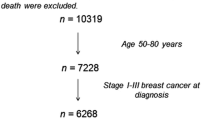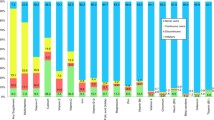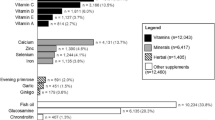Abstract
Vitamin supplement use after breast cancer diagnosis is common, but little is known about long-term effects on recurrence and survival. We examined postdiagnosis supplement use and risk of death or recurrence in the After Breast Cancer Pooling Project, a consortium of four cohorts of 12,019 breast cancer survivors from the United States and China. Post-treatment supplement use (vitamins A, B, C, D, E, and multivitamins) was assessed 1–5 years postdiagnosis. Associations with risk of recurrence, breast cancer-specific mortality, or total mortality were analyzed in Cox proportional hazards models separately by cohort. Individual cohort results were combined using random effects meta-analysis. Interactions with smoking, treatment, and hormonal status were examined. In multivariate models, vitamin E was associated with a decreased risk of recurrence (RR: 0.88; 95 % CI 0.79–0.99), and vitamin C with decreased risk of death (RR: 0.81; 95 % CI 0.72–0.92). However, when supplements were mutually adjusted, all associations were attenuated. There were no statistically significant associations with breast cancer mortality. The use of antioxidant supplements (multivitamins, vitamin C, or E) was not associated with recurrence, but was associated with a 16 % decreased risk of death (95 % CI 0.72–0.99). In addition, vitamin D was associated with decreased risk of recurrence among ER positive, but not ER negative tumors (p-interaction = 0.01). In this large consortium of breast cancer survivors, post-treatment use of vitamin supplements was not associated with increased risk of recurrence or death. Post-treatment use of antioxidant supplements was associated with improved survival, but the associations with individual supplement were difficult to determine. Stratification by ER status and considering antioxidants as a group may be more clinically relevant when evaluating associations with cancer risk and mortality.
Similar content being viewed by others
References
Greenlee H, Gammon MD, Abrahamson PE, Gaudet MM, Terry MB, Hershman DL, Desai M, Teitelbaum SL, Neugut AI, Jacobson JS (2009) Prevalence and predictors of antioxidant supplement use during breast cancer treatment: the Long Island Breast Cancer Study Project. Cancer 115:3271–3282. doi:10.1002/cncr.24378
Lawenda BD, Kelly KM, Ladas EJ, Sagar SM, Vickers A, Blumberg JB (2008) Should supplemental antioxidant administration be avoided during chemotherapy and radiation therapy? J Natl Cancer Inst 100:773–783. doi:10.1093/jnci/djn148
Greenlee H, Kwan ML, Kushi LH, Song J, Castillo A, Weltzien E, Quesenberry CP Jr, Caan BJ (2011) Antioxidant supplement use after breast cancer diagnosis and mortality in the Life After Cancer Epidemiology (LACE) cohort. Cancer. doi:10.1002/cncr.26526
Kwan ML, Greenlee H, Lee VS, Castillo A, Gunderson EP, Habel LA, Kushi LH, Sweeney C, Tam EK, Caan BJ (2011) Multivitamin use and breast cancer outcomes in women with early-stage breast cancer: the Life After Cancer Epidemiology study. Breast Cancer Res Treat 130:195–205. doi:10.1007/s10549-011-1557-4
Nechuta S, Lu W, Chen Z, Zheng Y, Gu K, Cai H, Zheng W, Shu XO (2011) Vitamin supplement use during breast cancer treatment and survival: a prospective cohort study. Cancer Epidemiol Biomarkers Prev 20:262–271. doi:10.1158/1055-9965.EPI-10-1072
Saquib J, Rock CL, Natarajan L, Saquib N, Newman VA, Patterson RE, Thomson CA, Al-Delaimy WK, Pierce JP (2011) Dietary intake, supplement use, and survival among women diagnosed with early-stage breast cancer. Nutr Cancer 63:327–333. doi:10.1080/01635581.2011.535957
Sellers TA, Alberts SR, Vierkant RA, Grabrick DM, Cerhan JR, Vachon CM, Olson JE, Kushi LH, Potter JD (2002) High-folate diets and breast cancer survival in a prospective cohort study. Nutr Cancer 44:139–144. doi:10.1207/S15327914NC4402_03
Fleischauer AT, Simonsen N, Arab L (2003) Antioxidant supplements and risk of breast cancer recurrence and breast cancer-related mortality among postmenopausal women. Nutr Cancer 46:15–22
Xu X, Gammon MD, Wetmur JG, Bradshaw PT, Teitelbaum SL, Neugut AI, Santella RM, Chen J (2008) B-vitamin intake, one-carbon metabolism, and survival in a population-based study of women with breast cancer. Cancer Epidemiol Biomarkers Prev 17:2109–2116. doi:10.1158/1055-9965.EPI-07-2900
Nechuta SJ, Caan BJ, Chen WY, Flatt SW, Lu W, Patterson RE, Poole EM, Kwan ML, Chen Z, Weltzien E, Pierce JP, Shu XO (2011) The After Breast Cancer Pooling Project: rationale, methodology, and breast cancer survivor characteristics. Cancer Causes Control 22:1319–1331. doi:10.1007/s10552-011-9805-9
Shu XO, Zheng Y, Cai H, Gu K, Chen Z, Zheng W, Lu W (2009) Soy food intake and breast cancer survival. JAMA 302:2437–2443. doi:10.1001/jama.2009.1783
Caan B, Sternfeld B, Gunderson E, Coates A, Quesenberry C, Slattery ML (2005) Life After Cancer Epidemiology (LACE) Study: a cohort of early stage breast cancer survivors (United States). Cancer Causes Control 16:545–556. doi:10.1007/s10552-004-8340-3
Pierce JP, Natarajan L, Caan BJ, Parker BA, Greenberg ER, Flatt SW, Rock CL, Kealey S, Al-Delaimy WK, Bardwell WA, Carlson RW, Emond JA, Faerber S, Gold EB, Hajek RA, Hollenbach K, Jones LA, Karanja N, Madlensky L, Marshall J, Newman VA, Ritenbaugh C, Thomson CA, Wasserman L, Stefanick ML (2007) Influence of a diet very high in vegetables, fruit, and fiber and low in fat on prognosis following treatment for breast cancer: the Women’s Healthy Eating and Living (WHEL) randomized trial. JAMA 298:289–298. doi:10.1001/jama.298.3.289
Colditz GA, Hankinson SE (2005) The Nurses’ Health Study: lifestyle and health among women. Nat Rev Cancer 5:388–396. doi:10.1038/nrc1608
Cui X, Rosner B, Willett WC, Hankinson SE (2011) Antioxidant intake and risk of endometrial cancer: results from the Nurses’ Health Study. Int J Cancer 128:1169–1178. doi:10.1002/ijc.25425
Smith-Warner SA, Spiegelman D, Ritz J, Albanes D, Beeson WL, Bernstein L, Berrino F, van den Brandt PA, Buring JE, Cho E, Colditz GA, Folsom AR, Freudenheim JL, Giovannucci E, Goldbohm RA, Graham S, Harnack L, Horn-Ross PL, Krogh V, Leitzmann MF, McCullough ML, Miller AB, Rodriguez C, Rohan TE, Schatzkin A, Shore R, Virtanen M, Willett WC, Wolk A, Zeleniuch-Jacquotte A, Zhang SM, Hunter DJ (2006) Methods for pooling results of epidemiologic studies: the Pooling Project of Prospective Studies of Diet and Cancer. Am J Epidemiol 163:1053–1064. doi:10.1093/aje/kwj127
DerSimonian R, Laird N (1986) Meta-analysis in clinical trials. Control Clin Trials 7:177–188
Omenn GS, Goodman GE, Thornquist MD, Balmes J, Cullen MR, Glass A, Keogh JP, Meyskens FL, Valanis B, Williams JH, Barnhart S, Hammar S (1996) Effects of a combination of beta carotene and vitamin A on lung cancer and cardiovascular disease. N Engl J Med 334:1150–1155. doi:10.1056/NEJM199605023341802
(1994) The effect of vitamin E and beta carotene on the incidence of lung cancer and other cancers in male smokers. The Alpha-Tocopherol, Beta Carotene Cancer Prevention Study Group. N Engl J Med 330:1029–1035. doi:10.1056/NEJM199404143301501
Meyer F, Bairati I, Fortin A, Gelinas M, Nabid A, Brochet F, Tetu B (2008) Interaction between antioxidant vitamin supplementation and cigarette smoking during radiation therapy in relation to long-term effects on recurrence and mortality: a randomized trial among head and neck cancer patients. Int J Cancer 122:1679–1683. doi:10.1002/ijc.23200
Ng K, Meyerhardt JA, Wu K, Feskanich D, Hollis BW, Giovannucci EL, Fuchs CS (2008) Circulating 25-hydroxyvitamin d levels and survival in patients with colorectal cancer. J Clin Oncol 26:2984–2991. doi:10.1200/JCO.2007.15.1027
Ng K, Wolpin BM, Meyerhardt JA, Wu K, Chan AT, Hollis BW, Giovannucci EL, Stampfer MJ, Willett WC, Fuchs CS (2009) Prospective study of predictors of vitamin D status and survival in patients with colorectal cancer. Br J Cancer 101:916–923. doi:10.1038/sj.bjc.6605262
Fedirko V, Riboli E, Tjonneland A, Ferrari P, Olsen A, Bueno-de-Mesquita HB, van Duijnhoven FJ, Norat T, Jansen EH, Dahm CC, Overvad K, Boutron-Ruault MC, Clavel-Chapelon F, Racine A, Lukanova A, Teucher B, Boeing H, Aleksandrova K, Trichopoulou A, Benetou V, Trichopoulos D, Grioni S, Vineis P, Panico S, Palli D, Tumino R, Siersema PD, Peeters PH, Skeie G, Brustad M, Chirlaque MD, Barricarte A, Ramon Quiros J, Sanchez MJ, Dorronsoro M, Bonet C, Palmqvist R, Hallmans G, Key TJ, Crowe F, Khaw KT, Wareham N, Romieu I, McKay J, Wark PA, Romaguera D, Jenab M (2012) Prediagnostic 25-hydroxyvitamin D, VDR and CASR polymorphisms, and survival in patients with colorectal cancer in western European populations. Cancer Epidemiol Biomarkers Prev 21:582–593. doi:10.1158/1055-9965.EPI-11-1065
Ren C, Qiu MZ, Wang DS, Luo HY, Zhang DS, Wang ZQ, Wang FH, Li YH, Zhou ZW, Xu RH (2012) Prognostic effects of 25-hydroxyvitamin D levels in gastric cancer. J Transl Med 10:16. doi:10.1186/1479-5876-10-16
Thomas X, Chelghoum Y, Fanari N, Cannas G (2011) Serum 25-hydroxyvitamin D levels are associated with prognosis in hematological malignancies. Hematology 16:278–283. doi:10.1179/102453311X13085644679908
Goodwin PJ (2009) Vitamin D in cancer patients: above all, do no harm. J Clin Oncol 27:2117–2119. doi:10.1200/JCO.2008.20.8629
Eaton CB, Young A, Allison MA, Robinson J, Martin LW, Kuller LH, Johnson KC, Curb JD, Van Horn L, McTiernan A, Liu S, Manson JE (2011) Prospective association of vitamin D concentrations with mortality in postmenopausal women: results from the Women’s Health Initiative (WHI). Am J Clin Nutr 94:1471–1478. doi:10.3945/ajcn.111.017715
Avenell A, MacLennan GS, Jenkinson DJ, McPherson GC, McDonald AM, Pant PR, Grant AM, Campbell MK, Anderson FH, Cooper C, Francis RM, Gillespie WJ, Robinson CM, Torgerson DJ, Wallace WA (2012) Long-term follow-up for mortality and cancer in a randomized placebo-controlled trial of vitamin D(3) and/or calcium (RECORD trial). J Clin Endocrinol Metab 97:614–622. doi:10.1210/jc.2011-1309
Meyer F, Liu G, Douville P, Samson E, Xu W, Adjei A, Bairati I (2011) Dietary vitamin D intake and serum 25-hydroxyvitamin D level in relation to disease outcomes in head and neck cancer patients. Int J Cancer 128:1741–1746. doi:10.1002/ijc.25496
Giovannucci E, Chan AT (2010) Role of vitamin and mineral supplementation and aspirin use in cancer survivors. J Clin Oncol 28:4081–4085. doi:10.1200/JCO.2009.27.3219
Yao S, Sucheston LE, Millen AE, Johnson CS, Trump DL, Nesline MK, Davis W, Hong CC, McCann SE, Hwang H, Kulkarni S, Edge SB, O’Connor TL, Ambrosone CB (2011) Pretreatment serum concentrations of 25-hydroxyvitamin D and breast cancer prognostic characteristics: a case–control and a case–series study. PLoS ONE 6:e17251. doi:10.1371/journal.pone.0017251
Peppone LJ, Rickles AS, Janelsins MC, Insalaco MR, Skinner KA (2012) The association between breast cancer prognostic indicators and serum 25-OH vitamin D levels. Ann Surg Oncol 19:2590–2599. doi:10.1245/s10434-012-2297-3
Rock CL, Emond JA, Flatt SW, Heath DD, Karanja N, Pakiz B, Sherwood NE, Thomson CA (2012) Weight loss is associated with increased serum 25-hydroxyvitamin D in overweight or obese women. Obesity (Silver Spring). doi:10.1038/oby.2012.57
Gozdzik A, Zhu J, Wong BY, Fu L, Cole DE, Parra EJ (2011) Association of vitamin D binding protein (VDBP) polymorphisms and serum 25(OH)D concentrations in a sample of young Canadian adults of different ancestry. J Steroid Biochem Mol Biol 127:405–412. doi:10.1016/j.jsbmb.2011.05.009
Acknowledgments
The NHS thanks the following state cancer registries for their help: AL, AZ, AR, CA, CO, CT, DE, FL, GA, ID, IL, IN, IA, KY, LA, ME, MD, MA, MI, NE, NH, NJ, NY, NC, ND, OH, OK, OR, PA, RI, SC, TN, TX, VA, WA, and WY. This study was supported by the National Institutes of Health (R01 CA118229-03S1, R01 CA118229, R01 CA129059, P01 CA87969, and T32 CA009001); the U.S. Army Medical Research and Materiel Command (DAMD 17-02-1-0607); and Susan G. Komen for the Cure (KG100988).
Conflict of interest
The authors declare that they have no conflict of interest.
Author information
Authors and Affiliations
Corresponding author
Electronic supplementary material
Below is the link to the electronic supplementary material.
Rights and permissions
About this article
Cite this article
Poole, E.M., Shu, X., Caan, B.J. et al. Postdiagnosis supplement use and breast cancer prognosis in the After Breast Cancer Pooling Project. Breast Cancer Res Treat 139, 529–537 (2013). https://doi.org/10.1007/s10549-013-2548-4
Received:
Accepted:
Published:
Issue Date:
DOI: https://doi.org/10.1007/s10549-013-2548-4




